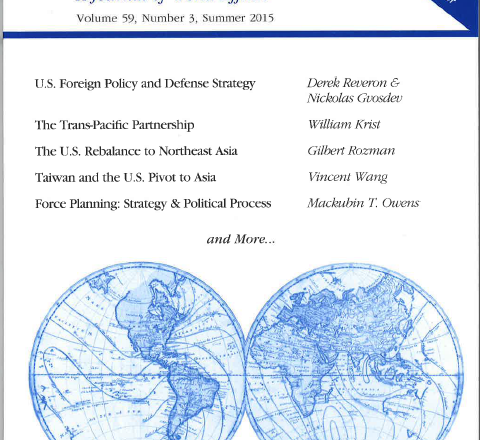A nation must think before it acts.
Presenting the Summer 2015 Orbis
 Mac Owens is Editor of Orbis, FPRI’s quarterly journal of international affairs, and Senior Fellow in our Program on National Security. Orbis is published for the Foreign Policy Research Institute by Elsevier. For subscription or other information, visit the Elsevier website. FPRI members at the $150 level or above receive a complimentary subscription (for individuals, not institutions). For membership information, please click here. To view this issue online, click here.
Mac Owens is Editor of Orbis, FPRI’s quarterly journal of international affairs, and Senior Fellow in our Program on National Security. Orbis is published for the Foreign Policy Research Institute by Elsevier. For subscription or other information, visit the Elsevier website. FPRI members at the $150 level or above receive a complimentary subscription (for individuals, not institutions). For membership information, please click here. To view this issue online, click here.
Our summer issue of Orbis leads with an article by Derek Reveron and Nick Gvosdev arguing that there is an enduring domestic consensus about America’s role in the world, which arises from a fundamental continuity in U.S. interests. They contend that since World War II, the United States has tended to fill security voids in order to ensure that the international system remains functional. But they say, although future U.S. grand strategy will be global and multilateral, it will be much more selective than it is today.
Richard Hooker examines U.S. grand strategy and contends that today’s grand strategy rests on traditional foundations that were visible even at the beginning of the American Republic. No matter how much it may be debated, U.S. grand strategy remains remarkably consistent from decade to decade.
We then present a cluster of articles addressing developments in the Asia-Pacific region. First, William Krist examines the Trans-Pacific Partnership, a free trade agreement under negotiation among the United States and 11 other countries. He argues that while the TTP would have an enormous impact on world trade and would advance U.S. foreign policy interests, modifications are needed to ensure its utility. Next, Gilbert Rozman considers the U.S. rebalance or “pivot” to Asia, focusing on Northeast Asia, which, he contends, poses the more complicated challenge.
Next, Vincent Wang addresses the effects of a possible rapprochement between China and Taiwan on the U.S. Asia rebalance. Finally, Jason Silver argues that America should establish safeguards to counter the ability of China’s government to compel Chinese companies and its citizens working in the United States to assist the Chinese government with the broadly defined mission of “safeguarding State security.” As such, new safeguards should be put in place to better protect U.S. national security.
Morena Skalamera examines the continuing Ukraine crisis. She contends that the standard narrative, which portrays the crisis simply as a contest between Ukraine’s desire to adopt Western-European standards of living and Russia’s historical attempt to pull Ukraine into sphere of influence, neglects the fact that Ukraine is strategic precisely because of its geographical position and its role as a transit country for Russian gas en route to Europe.
Finally, your humble editor addresses the art of force planning. On the one hand, decisions made to shape U.S. force structure must be driven by strategic logic. But in reality, force planners also have to take account of domestic politics and the competing roles of Congress and the President. The issue concludes with two complementary reviews of Henry Kissinger’s recent book World Order by FPRI senior fellows Walter A. McDougall and Theodore Friend.




